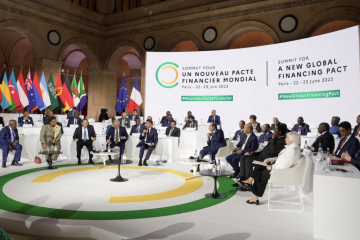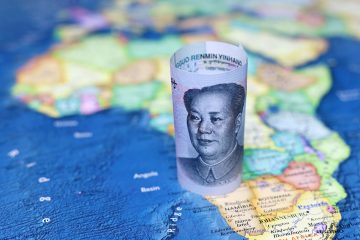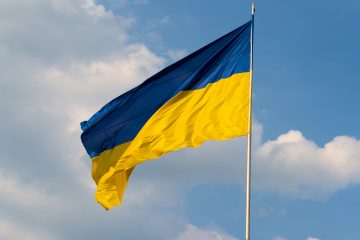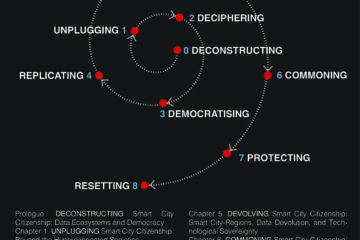
OxPol Blogcast. Politics, Re-Imagined — Displacement and the World Economy with Alexander Betts
How can we ensure that displaced people live in safety and dignity and create a policy that is sustainable at the same time? In this episode, we speak to Dr. Alexander Betts, the Leopold Muller Professor of Forced Migration and International Affairs at the Refugee Studies Centre, and the Director of the Refugee Economies Programme, both at the University of Oxford. Alexander has written extensively on the political economy of refugee protection — highlighting how displaced people can access and contribute to economies worldwide. Politics, Re-Imagined is a series by the Department of Politics and International Relations (DPIR) at the University of Oxford focused on exploring tangible and sustainable solutions to the most pressing challenges facing humanity today. Listen on:

The Paris Climate Summit: A Milestone for the Global South?
International summits are vital to promoting global agreement and laying the groundwork for future international cooperation. The Summit for a New Global Financial Pact took place in Paris, co-hosted by France’s President Emmanuel Macron and Barbados’ Prime Minister Mia Mottley. The Summit, organised with the aim of promoting global unity for international financial architecture form, set out to achieve four main goals focusing on fiscal sustainability and climate change in low-income countries. Amid the worldwide increase in extreme poverty and climate disasters, these conferences provide a platform for building coalitions to resolve urgent humanitarian issues. However, there has been a marked decline in international cooperation and the success of these events. In 2022, the United Nations Climate Change Conference COP27 …

China’s Role in Restructuring Debt in Africa
Africa’s public debt burden has doubled from 2010 to date. Data from the International Debt Statistics Data as of December 2022 shows that African countries owe $ 644855.2 billion (USD). The International Monetary Fund (IMF) and the World Bank consider 22 low-income African countries to be either in debt distress or at high risk of debt distress as of November 2022. Debt distress in this context means a country is experiencing difficulties in servicing its debt. A high debt burden could risk the continent’s economic growth, development, and climate investments. The additional global economic downturn and falling commodity process could compound the issue for countries on the continent. While there is no immediate threat of systemic and financial collapse due …

A Marshall Plan for Ukraine?
As policymakers and commentators grapple with understanding the direction of Russia’s invasion of Ukraine, they turn to the past for guidance. Are we at the beginning of a more general war –1914 or 1939? Or is the experience of how major wars end a guide? The Marshall Plan of 1948-1951 is all over the news as discussions get under way about the hoped-for recovery of Ukraine. “The war in Ukraine has caused the world, particularly the west, to look to the past for answers…. Marshall Plan history is no longer a niche,” says the Financial Times’s Gillian Tett. EU Commissioner Johannes Hahn, Prime Minister Boris Johnson, magazines like New Statesman, and think tanks like the Center for Economic and Policy …
How Can Political Theory Be More Useful to Policymaking?
Recently, scholars have reflected on how to make political theory more relevant to policy. While most of the ideas around this charge are centered around the debate between ideal and non-ideal theories¹, one might ask whether there are other methodological insights we can advance to make political philosophy more useful to politics and society. In this piece, I suggest that one avenue that should be explored consists of building a bridge between political theory and comparative political economy to theorise varieties of ideal regimes. As vaccination campaigns proceed throughout the globe, policymakers, activists, and scholars are thinking about what the post-Covid world will look like and how to repair their national economy. Many view this moment as a critical juncture …
Colombian Mass Protests: Foretelling an Emerging Latin American Debt Crisis?
S&P, a global credit rating agency, recently downgraded Colombia’s credit rating to a non-investment grade, implying that Colombian government bonds are now high-risk financial assets. The downgrade hit the country amid a wave of mass unrest. For over a month, Colombians spanning all strata of society protested in large numbers. Sparked initially by opposition to a government-proposed tax reform, which President Ivan Duque soon retracted, protesters expressed diverse demands, including calling for the Duque administration to resign, a series of social and economic reforms, a thorough implementation of Colombia’s 2016 peace agreement, and an end to police brutality. Protesters thus have called for nothing less than a complete overhaul of Colombia’s political and economic system. The protests form part of …

Smart City Citizenship: A Techno-Political Review (of Cities and Nations)
COVID-19 has hit European citizens dramatically, not only creating a general risk-driven environment with a wide array of economic vulnerabilities but also exposing them to pervasive digital risks, such as biosurveillance, misinformation, and e-democracy algorithmic threats. Over the course of the pandemic, a debate has emerged about the appropriate techno-political response when governments use disease surveillance technologies to tackle the spread of COVID-19. Citizens have pointed out the dichotomy between state-Leviathan cybercontrol and civil liberties. Moreover, the giant technological flagship firms of surveillance capitalism, such as Google, Amazon, and Facebook, have already assumed many functions previously associated with the nation-state, from cartography to the disease surveillance of citizens. But particularly, amidst the AI-driven algorithmic disruption and surveillance capitalism, Smart City Citizenship sheds light on the way citizens …
What if We Talked about Foreign Policy? Italy’s Opportunities for Global Leadership in 2021
After the Cold War and the fall of the First Italian Republic, Italy struggled to formulate a coherent foreign policy strategy. Generally, foreign policies at global level during the Cold War era were dictated by the bipolar relationship between the United States and the Soviet Union. Italian foreign policy, therefore, was a function of the United States’ sphere of influence and interests, and Italy was often a bridge and interlocutor for the Americans to the Middle East or Eastern Europe. With the collapse of the bipolar system and the disintegration of the major Italian political parties that were the core political actors in the aftermath of World War Two, Italian foreign policy was partially dictated by individual figures and was …









